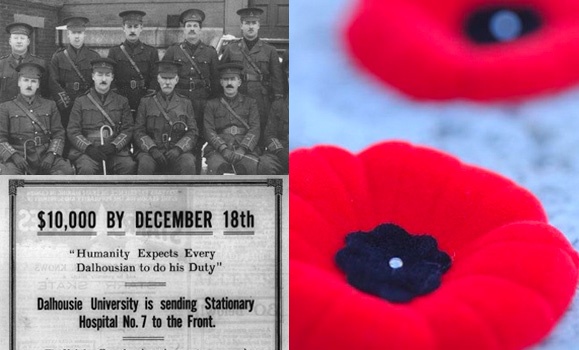This coming Monday, November 11, people and communities around the world will gather and pause to honour the sacrifices of the many individuals who have served and given their lives during wartime.
This year’s Remembrance Day follows on the heels of the 100th anniversary of the armistice that ended the First World War, a major milestone in the annals of commemoration. To give readers a sense of the sacrifices Dalhousians of all stripes — faculty, staff, students and alumni — made, we’ve compiled a list of five facts to know about Dal during the World Wars.
Dalhousie led a stationary hospital during the First World War
The First World War still resonates as one of history’s deadliest conflicts. As millions of men and women joined the war effort, including the 585 Dalhousie students and faculty who enlisted in some capacity, it’s no surprise that an urgent call was made for medical personnel to treat wounded on the front lines. Dalhousie University and its community answered that call by forming the No. 7 Stationary Hospital to serve in Europe. The unit included surgeons, physicians, nurses, and support staff—all volunteers, and many of them Dal students. Led by Lt. Col. Dr. John Stewart, a Dalhousie Medicine faculty member, the hospital of 165 doctors and nurses treated wounded soldiers — Axis and Ally alike — in northern France during the war’s final two years.
Read more: Spirit of service: The story of Dalhousie's field hospital in the First World War
Campus became a training ground for potential soldiers
The Dalhousie Canadian Officers’ Training Corps (OTC) was formed on campus to prepare young men for the trials of battle. What began as just an idea that attracted young male students (and a couple of female ones) to join the fight soon became a full-fledged militia corps that grew to take over a variety of campus spaces for drills and training.
Read more: Dal goes off to war
The Class of 1918 was hollowed out by war
In the fall of 1914, just weeks after the outbreak of the First World War in Europe, Dalhousie welcomed a new batch of students into its ranks. No one could have foreseen at that early stage just how big a toll the bloody conflict would take in the coming years on all involved. That year’s incoming class was no exception. The war and its broader impact meant high attrition rates for university students: by the time convocation rolled around roughly four years later, only 20 members of the Class of 1918’s 72 members were still enrolled at the university. Thirty-four of the students left Dal during those years to serve overseas on the front lines. Some discontinued their studies to contribute to the war effort in other ways. Three made what has been called “the supreme sacrifice,” perishing on the battlefield.
Read more: Pomp and circumstance: Dal Convocation through the years
The Second World War also took a heavy toll at Dal
As historian P.B. Waite wrote about the Second World War in The Lives of Dalhousie University (Volume Two), “The war devastated Dalhousie, not by bombs or explosions, but by the tremendous weight of government manpower needs in a vital seaport city, and by the concomitant haemorrhage of staff, of students, of energies. Within three years C.L. Bennet, registrar and professor of English, himself a veteran of the First World War, could say, ‘You couldn’t form even a platoon of able-bodied men at Dalhousie right now. There aren’t any.’”
Read more: Dalhousie, the Second World War, and the Philosopher-King, 1939-1943 (from The Lives of Dalhousie University, Volume Two)
WWII veterans helped spur a post-war enrolment bounce
The Canadian government's Veterans' Rehabilitation Act that provided financial support for veterans to attend university or undertake other training. This policy, which covered grants and fees equal to the length of a vet's war service, led to a big boost in enrolment at Dalhousie. As P.B. Waite notes, "The contrast between the Dalhousie of 1944-5 and 1945-6 was, as one student put it, 'electric.' Dalhousie’s enrolment in 1943-4 was 654, the lowest it had been since 1919-20, when it was 621. In 1944-5 it rose by 9 per cent, but in 1945-6 the increase was a huge 62 per cent. Some 1,153 students registered in the fall of 1945, of whom the veterans were nearly half. They were still 40 per cent of the student body as late as 1950. Veterans transformed the place."
Read more: A.E. Kerr and the Veterans, 1945-1951 (from The Lives of Dalhousie University, Volume Two)

